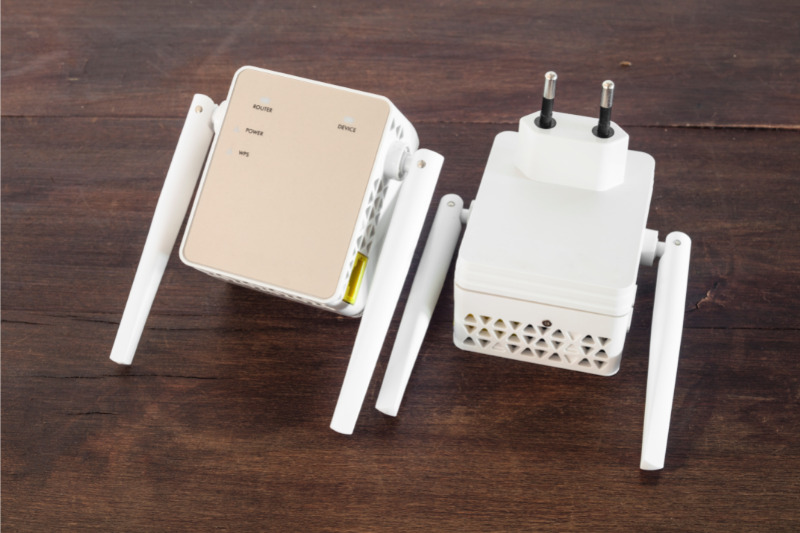
As the name suggests, a Wi-Fi extender receives signals from a Wi-Fi router to extend the range of the signal for the user’s device. It acts as a bridge between a Wi-Fi router and a device that is unable to intercept the Wi-Fi signal being outside its range. An extender connects to the wireless network from the Wi-Fi router to retransmit it to a device. It serves as a wireless access point for various devices that require a Wi-Fi signal once connected.
Most people have a Wi-Fi router set up at their workspaces but encounter issues where their devices lose signal as they proceed away from a router. Small and medium businesses that need a cost-effective solution for this problem can certainly consider wireless range extenders as the safest deal. It reliably boosts internet speeds at dead zones above 80 megabits per second. Let’s take a look at some of the range extender’s numerous features.
How Does a Range Extender Work?
If you have placed your wireless router at a centralized location in your office space because of which the devices installed in the corner spaces are out of Wi-Fi range, a Wi-Fi extender will cater to your requirement of uniform and consistent Wi-Fi coverage by adding some easy-to-install additional hardware without the need to run cables. The SSID, or service set identifier, is the name that your wireless router uses to broadcast a wireless signal with a customizable name. So if this name is “Office”, the Wi-Fi extender with its own SSID will set up a signal named, say “OfficeExt”, once the extender is configured and hooked up to the router via a LAN cable.
Now, this is what a lot of people overlook, so it is extremely important to carry out a proper extender setup for a business to run smoothly and without facing Wi-Fi dead zones or lags. Hardwiring a range extender is the sure-shot way to secure optimum performance. Downtown Managed Services provides a vast range of top-notch B2B Managed Services in Florida. Its proactive customer support system is just a call away in catering to every technical problem that you might encounter with a wireless range extender or other Wi-Fi problems.
Right Positioning of Range Extenders
Once connected, the range extender has its own wireless signal that will be broadcasted throughout the area. But here’s the thing: a Wi-Fi extender, in addition to amplifying the router signal, broadcasts its very own signal via the router’s Internet access. If this will be your first shot at installing a range extender for your business, seeking expert advice to choose from the plethora of options available in the market is always encouraged.
At Downtown Managed Services, you get the best consultation for enhanced Wi-Fi coverage by a robust team carrying 25 years of experience with B2B Managed Services in Florida.
Having More than One Wi-Fi Extender Within the Same Space
Theoretically, having multiple Wi-Fi extenders on the same connection should not be a problem. But it gets a little bit complicated technically since the second Wi-Fi extender connects to the first Wi-Fi extender to deliver poor speed.
That being said, another dicey factor about extenders is that the network quality degrades by half so it might not be reliable in all situations. There are several other options like mesh networks or wired AP units that you can consider if network degradation remains a concern.
Can You Connect Any Wi-Fi Extender to the Router or Does it Have to be the Same Brand?
There are people who use the modem and the router that comes with their ISP and those who buy their own router. While the answer to the above question is no, Wi-Fi extenders are pretty universal. They work with picking up the Wi-Fi signal so they don’t really care about who or what transmits it.
Nonetheless, having a router and an extender of the same brand is comparatively advantageous because they are equipped with some software or management application that enables the user to manage devices via a single interface.
There’s also another plus point, you don’t need to worry about matching the brand of your router with your extender since almost every modern router has a WPS button for Wi-Fi protected setup. They also probably won’t be able to hit your network’s maximum speed. Most cap between 50 to 75 megabits per second. Much recently, different companies have been revamping their wireless range extender models to support Wi-Fi-6, the latest version of Wi-Fi.
🔗Want to know more about other services we offer?
If you have fewer devices in your workspace and want to ensure good internet connectivity in the corner spaces, installing a range extender won’t hurt. To begin your experience with a Wi-Fi extender, schedule an appointment with us at either of our offices at Boca Raton or Fort Lauderdale.

